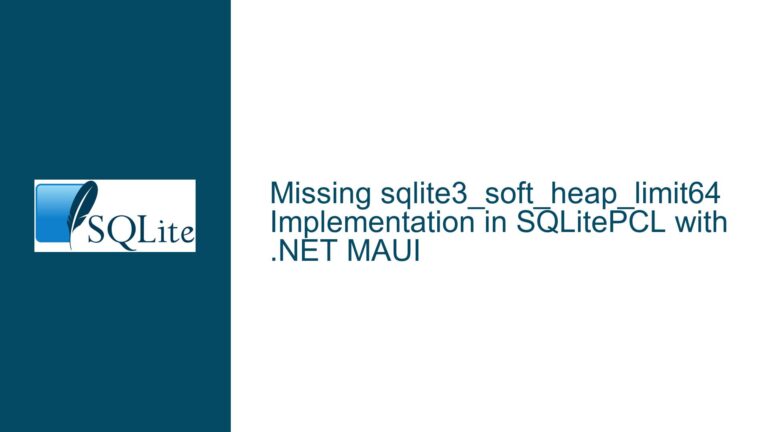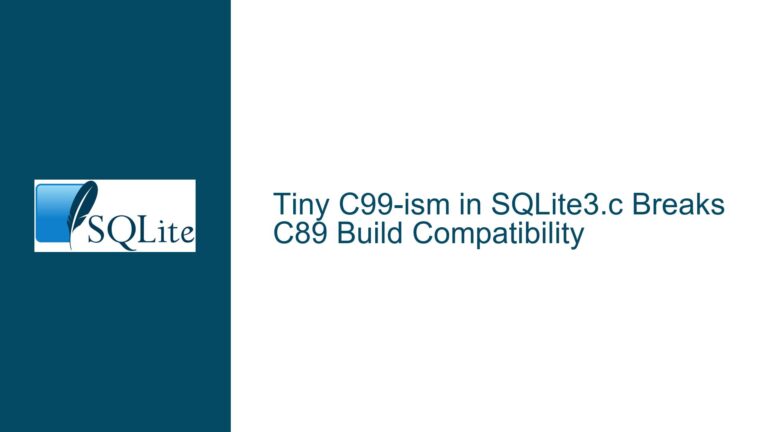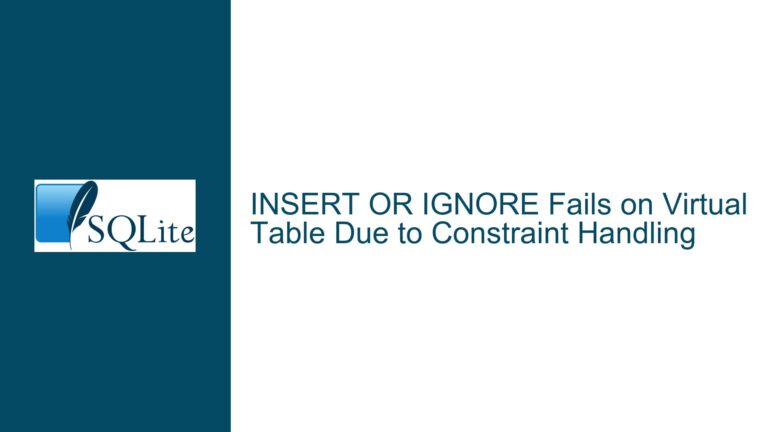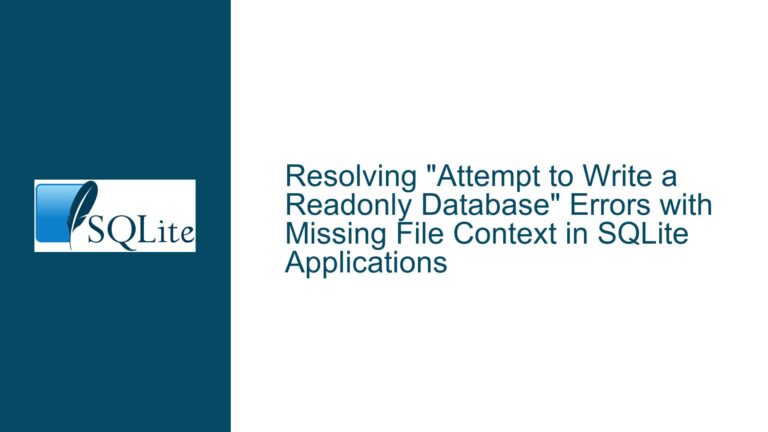SQLite .dump Failure with reverse_unordered_selects: Trigger/View Dependency Order
Understanding the Trigger/View Dependency Order in .dump Output
The core issue arises when using the SQLite .dump command after enabling the reverse_unordered_selects pragma, leading to an invalid dump file. The problem occurs because the .dump command outputs schema objects (specifically triggers and views) in an order that violates dependencies. For example, a trigger referencing a view may be dumped before the view itself, causing errors during re-import such as no such table: v. This behavior stems from a missing ORDER BY clause in the internal query responsible for schema extraction during .dump. The reverse_unordered_selects pragma reverses the default output order of SELECT statements lacking explicit ordering, which destabilizes implicit assumptions about schema object dependencies.
Root Causes of Dependency Violations in Schema Dumps
Missing Explicit Ordering in Schema Queries:
The.dumpcommand retrieves schema objects (views, triggers, indexes) using aSELECTquery onsqlite_schemawithout anORDER BYclause. By default, SQLite returns rows in an unspecified order whenORDER BYis omitted. However, thereverse_unordered_selectspragma inverts this implicit order, causing dependent objects (e.g., triggers) to appear before their prerequisites (e.g., views).Dependency Awareness in Schema Serialization:
SQLite’s.dumpcommand does not perform dependency resolution when generating schema definitions. Instead, it relies on the order of entries insqlite_schema. Whenreverse_unordered_selectsis enabled, the absence of explicit ordering disrupts the natural insertion order of objects, leading to invalid sequences.Pragma-Driven Query Behavior:
Thereverse_unordered_selectspragma modifies the query planner’s behavior for unorderedSELECTstatements. This pragma is designed for debugging and testing, but its interaction with internal schema queries (like those in.dump) was not fully accounted for, resulting in non-idiomatic schema output.
Resolving Invalid .dump Output via Schema Order Enforcement
Step 1: Diagnose the Presence of reverse_unordered_selects
Before executing .dump, check if reverse_unordered_selects is enabled:
PRAGMA reverse_unordered_selects;
If the result is 1, the pragma is active. Disable it temporarily for schema dumps:
PRAGMA reverse_unordered_selects = 0;
Note: This is a session-level setting. Closing and reopening the database connection resets it to the default (0).
Step 2: Patch the SQLite Shell (Advanced)
Modify the SQLite shell’s source code to enforce ordering in schema queries. The fix involves adding an ORDER BY clause to prioritize views over triggers. Apply this patch to src/shell.c.in:
@@ -8373,11 +8373,12 @@
sqlite3_free(zSql);
if( (p->shellFlgs & SHFLG_DumpDataOnly)==0 ){
zSql = sqlite3_mprintf(
"SELECT sql FROM sqlite_schema AS o "
"WHERE (%s) AND sql NOT NULL"
- " AND type IN ('index','trigger','view')",
+ " AND type IN ('index','trigger','view')"
+ " ORDER BY type='trigger'",
zLike
);
run_table_dump_query(p, zSql);
sqlite3_free(zSql);
}
This change sorts schema objects such that triggers (type='trigger') are listed last. The expression type='trigger' evaluates to 1 for triggers and 0 for other types, ensuring non-trigger objects (views, indexes) are dumped first.
Step 3: Upgrade to SQLite 3.45.1 or Later
The issue is resolved in SQLite trunk (version 3.45.1 and newer). Upgrading ensures the .dump command includes the necessary ordering without manual patching. Verify your SQLite version:
sqlite3 --version
If using an affected version (e.g., 3.45.0), download the latest pre-release or build from source.
Step 4: Validate Dump Output
After applying fixes, test the .dump command:
sqlite3 test.db .dump > dump.sql
sqlite3 restored.db < dump.sql
Ensure no errors occur during restoration, particularly no such table or trigger cannot reference view messages.
Step 5: Avoid Reliance on Implicit Ordering
When scripting or automating schema operations, explicitly define dependencies using ORDER BY in queries against sqlite_schema. For example:
SELECT name, sql FROM sqlite_schema
WHERE type IN ('view', 'trigger')
ORDER BY
CASE type
WHEN 'view' THEN 1
WHEN 'trigger' THEN 2
ELSE 3
END;
This ensures views are processed before triggers, regardless of pragma settings.
Step 6: Document Pragmas with Side Effects
If your workflow requires reverse_unordered_selects, document its implications for schema operations. Consider wrapping .dump commands in scripts that temporarily disable the pragma:
sqlite3 input.db "PRAGMA reverse_unordered_selects=0; .output dump.sql; .dump; .exit"
Conclusion: The .dump command’s dependency on implicit SELECT ordering makes it vulnerable to pragmas that alter default query behavior. Explicitly ordering schema objects by type resolves this, ensuring reliable database restoration.






